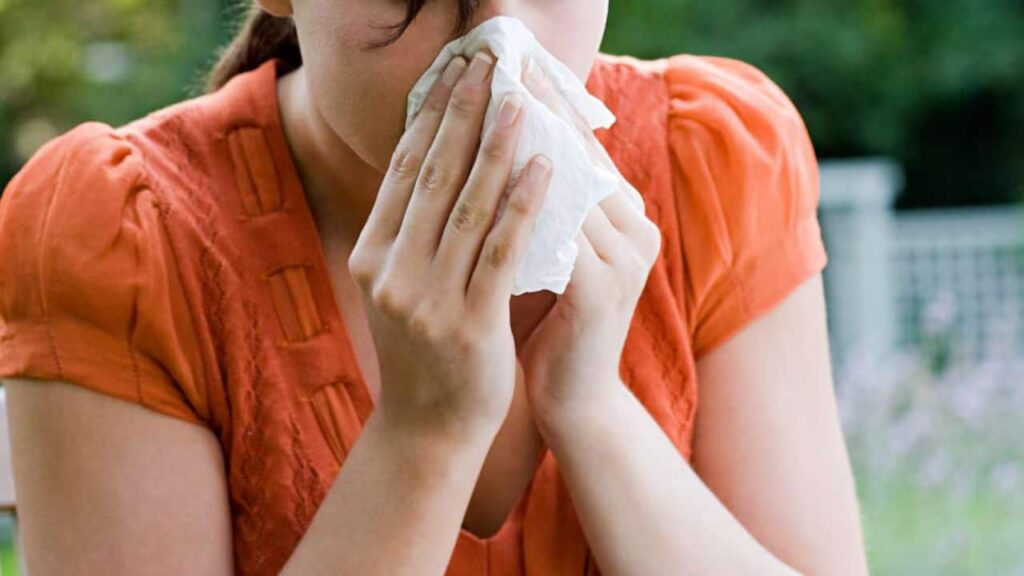Seasonal allergies can significantly impact daily life, causing discomfort and interrupting routines. Many people seek natural, effective ways to manage symptoms without relying solely on over-the-counter medications. This article delves into various seasonal allergy relief home remedies and allergy prevention tips to help alleviate seasonal allergy symptoms. By incorporating these strategies, you can enjoy a more comfortable and allergy-free life.
What is Seasonal Allergies?
Seasonal allergies, also called “Hay fever” or “seasonal allergic rhinitis“. During specific seasons of the year, trees, grasses, and weeds release microscopic pollen particles into the atmosphere to fertilize other plants, which causes these allergic symptoms.
Can Allergies Cause Swollen Lymph Nodes?
Yes, allergies can cause swollen lymph nodes. When the body encounters an allergen, the immune system ramps up its response, sometimes causing lymph nodes to swell. This is part of the body’s defense mechanism, indicating an active immune response to fight off what it perceives as a threat.
Seasonal Allergy relief home remedies
Here are some best Seasonal Allergy relief home remedies.
I. Dietary Adjustments
1. Anti-Inflammatory Foods
If includes anti-inflammatory foods into your diet it can help reduce the allergy symptoms. These foods include:
- Fruits and Vegetables: Rich in vitamins supplements and antioxidants. Examples include berries, citrus fruits, and leafy greens.
- Omega-3 Fatty Acids: Found in fish like salmon, flaxseeds, and walnuts, these fats can reduce inflammation.
- Probiotics: Yogurt and fermented foods like kimchi and sauerkraut can improve gut health and boost the immune system.
2. Avoiding Allergy Triggers
Some foods can exacerbate allergy symptoms. Common culprits include:
- Dairy Products: Can increase mucus production.
- Processed Foods: Often contain additives and preservatives that may trigger allergies.
- Alcohol and Caffeine: Can dehydrate the body, worsening symptoms.
II. Herbal Remedies
1. Butterbur
Butterbur (Petasites hybridus) is known for its ability to reduce inflammation and block histamines. Studies have shown that it can be as effective as some antihistamine medications without causing drowsiness.
2. Stinging Nettle
Stinging nettle (Urtica dioica) has been used traditionally to treat a variety of ailments, including allergies. It contains natural antihistamines and anti-inflammatory properties that help alleviate symptoms.
3. Quercetin
Numerous fruits and vegetables contain the flavonoid quercetin.. It stabilizes mast cells, which release histamines and inflammatory compounds during allergic reactions. Foods high in quercetin include apples, onions, and berries.
III. Essential Oils
1. Peppermint Oil
Peppermint oil can help open up nasal passages and reduce congestion. Inhaling steam with a few drops of peppermint oil can provide immediate relief.
2. Eucalyptus Oil
Eucalyptus oil has anti-inflammatory and decongestant properties. Adding a few drops to a diffuser or a hot bath can help clear nasal passages and improve breathing.
3. Lavender Oil
Lavender oil is known for its calming effects and can also help reduce inflammation. Diffusing lavender oil or applying it diluted to the skin can help ease allergy symptoms.
IV. Lifestyle Changes
1. Regular Exercise
Both inflammation and the immune system can be strengthened by exercise. On most days of the week, try to get in at least 30 minutes of moderate activity. Activities like walking, cycling, and hot yoga can be particularly beneficial.
2. Clean Living Environment
Keeping your home clean and allergen-free can significantly reduce symptoms. Tips include:
- Vacuum Regularly: Use a vacuum with a HEPA filter to trap allergens.
- Wash Bedding: Clean sheets and pillowcases weekly in hot water.
- Reduce Clutter: Clutter can collect dust and allergens, so keep spaces tidy.
V. Outdoor Precautions
1. Check Pollen Counts
Before heading outdoors, check local pollen counts. Websites and apps can provide daily updates, helping you plan activities when counts are lower.
2. Wear Sunglasses and Hats
If you wear sunglasses and hats. It can help prevent pollen from getting into your eyes and hair, reducing exposure.
3. Shower After Outdoor Activities
After spending time outside, take a shower to wash off any pollen that may have settled on your skin and hair. This can prevent allergens from spreading throughout your home.
VI. Hydration and Fluids
1. Drink Plenty of Water
Staying hydrated helps thin mucus, making it easier for the body to expel. Try to consume eight glasses of water or more each day seasonal allergy relief home remedies.
2. Herbal Teas
Herbal teas like chamomile and ginger can soothe irritated airways and provide anti-inflammatory benefits. Local honey added to tea can also help build tolerance to local pollen.
3. Broths and Soups
Warm broths and soups can help clear nasal passages and provide hydration. Chicken soup, in particular, has been shown to have mild anti-inflammatory properties.
VII. Mind-Body Techniques
1. Yoga
Buti Yoga combines physical movement with breathing exercises, which can help reduce stress and improve respiratory function. Poses like downward dog and bridge pose can open up the chest and improve airflow.
2. Meditation
Meditation can reduce stress, which is known to exacerbate allergy symptoms. Practicing mindfulness meditation for 10–15 minutes a day can improve overall well-being.
3. Acupuncture
Acupuncture has been shown to reduce allergy symptoms by stimulating specific points on the body. It can help balance the immune system and reduce inflammation.
VIII. Additional Resources
1. Local Allergy Clinics
Consulting with an allergist can provide personalized treatment plans and advice. Allergy tests can identify specific triggers, allowing for more targeted prevention and treatment.
2. Online Forums and Support Groups
Joining online forums and support groups can provide valuable tips and emotional support from others experiencing similar issues.
3. Educational Websites
Websites like the American College of Allergy, Asthma, and Immunology (ACAAI) offer comprehensive resources on managing allergies.
Allergy Prevention Tips
A combination of exposure reduction and immune-boosting techniques are used to prevent allergies. Here are some practical allergy prevention tips:
- Use Air Purifiers: High-efficiency particulate air (HEPA) filters can remove allergens from the air in your home.
- Keep Windows Closed: During high pollen seasons, keep windows closed and use air conditioning to filter out allergens.
- Change HVAC Filters: Regularly changing HVAC filters can improve indoor air quality.
- Wear a Mask: When doing yard work or gardening, wear a mask to reduce inhalation of allergens.
- Avoid Smoking: Smoking and secondhand smoke can aggravate allergy symptoms and damage the respiratory system.
- Wash Pets: Regularly bathe pets to reduce the amount of dander and allergens they carry.
Managing seasonal allergies can be challenging, but incorporating natural seasonal Allergy relief home remedies and allergy prevention tips can provide significant relief. You can reduce seasonal allergy symptoms and improve your life quality by taking dietary items, using herbal home remedies like essential oils, and making lifestyle changes. For personalized advice and additional resources, consider consulting with a healthcare professional. With these strategies, you can enjoy a more comfortable and allergy-free season.
Causes and Types of Seasonal Allergies:
Here are explain the causes and types with seasonal allergy relief home remedies.
| Season | Common Allergens | Description |
|---|---|---|
| Spring | Tree Pollen | Trees like oak, maple, birch, and cedar release pollen, which is a major trigger for spring allergies. |
| Summer | Grass Pollen | Grasses such as Bermuda, Timothy, and Kentucky bluegrass release pollen, peaking in late spring to summer. |
| Fall | Weed Pollen | Weeds like ragweed, sagebrush, and pigweed produce pollen, with ragweed being a significant fall allergen. |
| Year-Round | Mold Spores | Mold spores from damp areas and fallen leaves can be present in all seasons, thriving in warm, humid conditions. |
| Year-Round | Dust Mites | Dust mites are present throughout the year in indoor environments, feeding on dead skin cells and thriving in warm, humid conditions. |
FAQS
What are some effective herbal remedies for allergies?
There are some effective herbal remedies include butterbur, which reduces inflammation and blocks histamines; stinging nettle, which acts as a natural antihistamine.
What types of air purifiers are best for allergies?
Air purifiers with HEPA filters are most effective for allergies as they can trap tiny particles like pollen, dust mites, and pet dander.
How to get rid of seasonal allergies permanently?
To potentially get rid of seasonal allergies permanently, consider allergen immunotherapy, which can desensitize your immune system to specific allergens over time. Additionally, consistently avoiding exposure to known allergens and maintaining a clean home environment can help reduce symptoms significantly.



